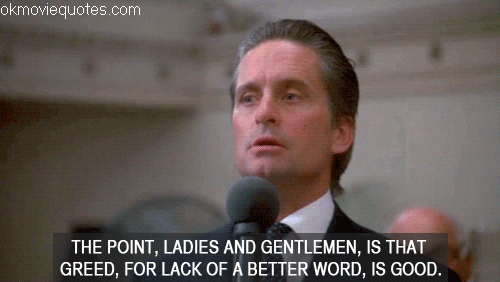Greed has long been a driving force on Wall Street, leading to reckless and unethical behavior that has had serious consequences for both individual investors and the broader economy. In this essay, we will explore the nature of greed on Wall Street, its effects, and what can be done to mitigate its negative impacts.
At its core, greed is an intense desire for wealth, power, or other material possessions. It can manifest itself in a variety of ways, from hoarding money and resources to engaging in risky or dishonest behavior to get ahead. On Wall Street, greed is often fueled by the high stakes and fast-paced nature of the financial industry, where success is often measured by the size of one's profits and the speed at which they are achieved.
One of the most famous examples of Wall Street greed is the stock market crash of 1929, which was fueled by reckless speculation and insider trading. In the years leading up to the crash, many investors were driven by greed to pour money into stocks that were overvalued and likely to crash. When the bubble eventually burst, it wiped out billions of dollars in wealth and set off a worldwide economic depression.
More recently, the global financial crisis of 2008 was also fueled by greed on Wall Street. In this case, banks and financial institutions engaged in risky and irresponsible practices, such as issuing subprime mortgages to borrowers who could not afford them and packaging those mortgages into securities that were sold to investors. When the housing market collapsed and the securities lost value, it caused a chain reaction that nearly brought down the global financial system.
The negative impacts of greed on Wall Street are not limited to financial crises. It can also lead to unethical behavior, such as insider trading and fraud, which can erode trust in the financial system and undermine its stability. It can also contribute to income inequality and social unrest, as the wealth and power of a few are prioritized over the needs and well-being of the many.
So, what can be done to mitigate the negative impacts of greed on Wall Street? One solution is increased regulation and oversight to ensure that financial institutions are held accountable for their actions. This can include stricter rules and penalties for unethical behavior and greater transparency in financial markets.
Another solution is to change the culture of Wall Street itself, to shift the focus from short-term profits to more sustainable and responsible forms of growth. This could involve promoting values such as integrity, fairness, and social responsibility, and rewarding financial professionals who embody these values.
In conclusion, greed has long been a driving force on Wall Street, with serious consequences for both individual investors and the broader economy. To mitigate its negative impacts, we must take action to increase regulation and oversight, and work to shift the culture of Wall Street towards more sustainable and responsible forms of growth.







